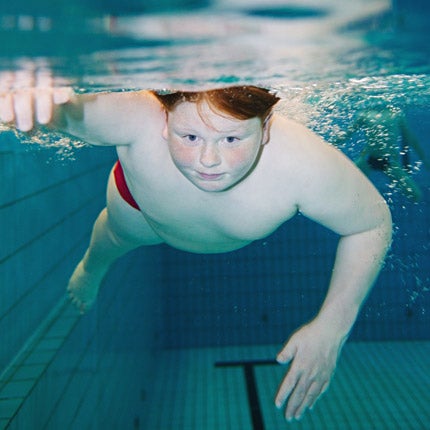Sporting solutions to help take the weight off
Two academics explain the causes of childhood obesity and how to deal with it

Your support helps us to tell the story
From reproductive rights to climate change to Big Tech, The Independent is on the ground when the story is developing. Whether it's investigating the financials of Elon Musk's pro-Trump PAC or producing our latest documentary, 'The A Word', which shines a light on the American women fighting for reproductive rights, we know how important it is to parse out the facts from the messaging.
At such a critical moment in US history, we need reporters on the ground. Your donation allows us to keep sending journalists to speak to both sides of the story.
The Independent is trusted by Americans across the entire political spectrum. And unlike many other quality news outlets, we choose not to lock Americans out of our reporting and analysis with paywalls. We believe quality journalism should be available to everyone, paid for by those who can afford it.
Your support makes all the difference.'The key thing is to get children to find activities they enjoy'
Martin Hagger is a reader in social and health psychology at the School of Psychology, University of Nottingham, and will take up professorship in psychology in the School of Psychology and Speech Pathology at Curtin University in Perth, Australia, from April.
"The main reasons for childhood obesity are probably environmental. We, that is, people in the 'Western' or 'developed' world, live in what behavioural scientists call an 'obesogenic environment'. This means that environmental factors are very conducive to children consuming foods that are high in saturated fat and calories to excess. A key factor here is the abundant availability of cheap, calorie-dense foods marketed by a food industry directly at children and their parents, and that remains relatively unchecked by watchdog agencies.
Also, children do not undertake enough physical activity on a regular basis, with increased automatisation of transport and less exertion as a 'matter of course', such as by walking to school or in extramural activities.
Exercise psychology can make an essential contribution to solving these problems, because they are behavioural in nature. Exercise psychologists try to understand the psychological factors that influence people's behaviour, looking at factors such as attitudes, beliefs, motives, judgements, intentions, habits, personality, self-control and actual behaviour. Exercise psychology can also help identify interventions, delivered via the media, teachers, parents or the internet, that will promote exercise among children.
My work involves aiming to get children and adults to better self-regulate their physical activity behaviour. We have found children are often turned off exercise because they do not find the activities they do enjoyable or they feel they are bad at it or incompetent. The key thing is to get children to try activities and find ones they enjoy, because it means they are more likely to change and modify their behaviour as a result.
We also try to promote increased self-control by helping people to manage their days more effectively and plan to fit exercise in. Families who plan to do something active together that they enjoy is a key target and is successful in increasing activities levels.
However, this needs to be accompanied by environmental and dietary changes that recruit different groups and people interested in changing behaviour, including local government, schools and educators, the food industry and families. This should be the approach to achieve lasting behaviour change. People simply won't do it on their own."
'We no longer have to physically exert ourselves the way we used to do'
Robert Copeland is a principal research fellow at the Centre for Sport and Exercise Science, Sheffield Hallam University.
"We have so many energy-saving devices now, all linked to improvement in technologies, that we no longer have to physically exert ourselves the way we used to do digging for food, washing clothes and so on. This has a knock-on effect on children. We also live in an environment where highly-calorific foods are so much more readily available and often appear more attractive.
I don't think sport and exercise science can provide all the solutions to childhood obesity, but we certainly have a role in changing behaviour. My own research, for example, is involved in understanding the choices people make that lead them to become overweight and what governs them. That means that when I go on to help people plan practical steps, I have a good idea of what the source of their enduring motivation will be. In the past, the focus has been on what we think obese people should be doing for the good of their health, whereas this model takes into consideration people's own individual values and motivations. This is particularly important with children.
Although I work in a university setting, we are increasingly trying to translate it into community-based activities. For instance, we have been experimenting with an exercise lab we have at the university, with video walls where MTV is played and we have pool tables. While playing, we might talk with the youngsters about some of the barriers they face in exercise, along with their motivations to change. Then we move on to the treadmill and bike to help them get a sense of what it is like to increase their heart rate and talk about these sensations being normal and nothing to fear. It is a setting and technique that is proving positive.
We include parents in our conversations too, as they are the real agents of change. They ultimately make decisions about the groceries and general patterns of life."
Join our commenting forum
Join thought-provoking conversations, follow other Independent readers and see their replies
Comments